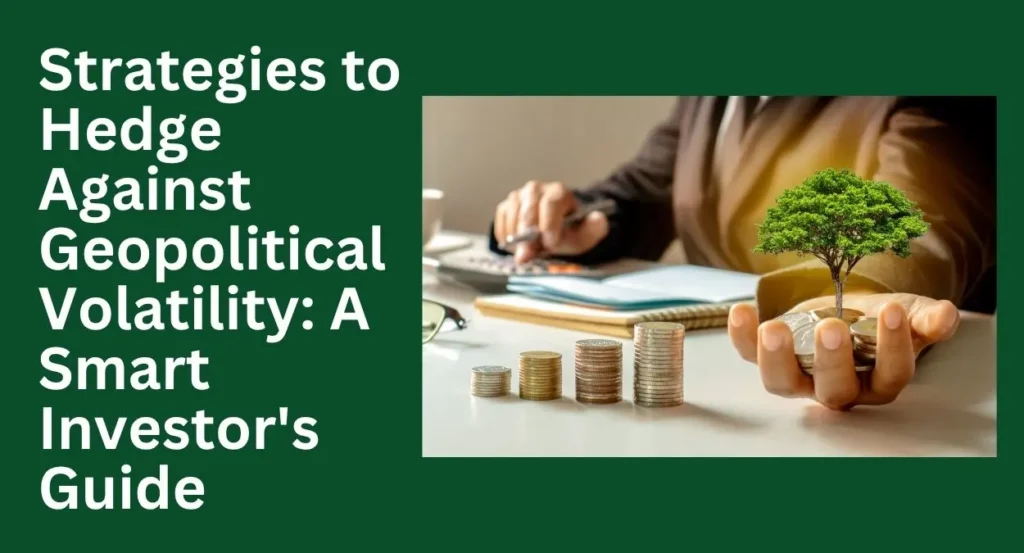In today’s interconnected world, geopolitical events—ranging from wars and trade disputes to elections and sanctions—can significantly disrupt global markets. The Russia-Ukraine conflict, U.S.-China tensions, Middle East instability, and election cycles in key economies have highlighted how quickly investor sentiment can swing. For both individual and institutional investors, developing strategies to hedge against geopolitical volatility has become not just important, but essential.
This article outlines the most effective hedging strategies, explores asset classes that offer safety, and provides insights into building a resilient portfolio amid global uncertainty.

Understanding Geopolitical Risk
Geopolitical risk refers to the potential impact of political, military, or diplomatic developments on financial markets. These events can lead to supply chain disruptions, commodity price spikes, currency fluctuations, inflation surges, and declining investor confidence.
Examples of geopolitical triggers:
- Armed conflicts (e.g., Russia-Ukraine war)
- Trade wars (e.g., U.S.-China trade disputes)
- Political instability (e.g., elections in emerging markets)
- Economic sanctions (e.g., Iran, North Korea)
- Terrorist attacks or cyber warfare
Top Strategies to Hedge Against Geopolitical Volatility
1. Diversification Across Geographies and Asset Classes
Spreading investments across countries and asset types reduces dependency on any single market. When one region experiences turmoil, others may remain stable or even benefit.
How to do it:
- Allocate investments to both developed (U.S., Europe, Japan) and emerging markets (India, Brazil, Southeast Asia)
- Balance equity exposure with bonds, commodities, and alternative investments
- Use Exchange-Traded Funds (ETFs) to access foreign markets cost-effectively
2. Invest in Safe-Haven Assets
Certain asset classes historically outperform during crises because of their perceived stability.
Top safe-haven assets:
- Gold: Traditionally used to hedge inflation and political instability
- U.S. Treasuries: Considered the safest fixed-income investments globally
- Swiss Franc and Japanese Yen: Currencies that attract capital during uncertainty
- Defensive Stocks: Consumer staples, utilities, and healthcare often see less impact during downturns
3. Use of Hedging Instruments (Derivatives)
Options and futures allow investors to protect downside risk without exiting core positions.
Popular tools:
- Put Options: Protect against a drop in specific stock or index value
- Futures Contracts: Lock in prices for commodities or currencies
- VIX Options/ETFs: Trade based on volatility expectations
- Currency Hedging: Use forward contracts to manage forex risk in global investments
4. Hold Cash or Short-term Government Bonds
Cash is not just a buffer but a strategic asset during uncertainty. Short-term sovereign bonds offer safety with liquidity.
Why this matters:
- Enables quick deployment into undervalued assets during market correction
- Avoids forced liquidation of long-term holdings during downturns
- Provides a cushion against inflation spikes caused by geopolitical disruption
5. Geopolitical Risk Insurance (for Businesses)
For companies operating internationally, insurance against expropriation, political violence, or breach of contract can protect assets and revenue.
Providers: Multilateral agencies like MIGA (World Bank Group) or private players like Lloyd’s of London
6. Focus on Resilient Sectors and Companies
Some industries tend to be more insulated from global shocks.
Resilient sectors:
- Defense & Aerospace: Often see increased spending during geopolitical tension
- Energy (Oil & Gas): Beneficiaries of supply disruptions
- Technology: Especially firms with strong cash flows and global reach
- Agriculture & Food Processing: Essential goods that remain in demand
7.Scenario Planning and Stress Testing
Institutional investors and fund managers often simulate worst-case scenarios to assess portfolio impact.
How to implement:
- Use financial modeling to predict outcomes under different crisis scenarios
- Adjust asset allocation based on the results
- Regularly update based on global political developments
Real-World Examples of Hedging in Action
- 2022 Russia-Ukraine War: Gold and energy prices surged. Investors in oil ETFs and gold funds saw positive returns.
- Brexit (2016): UK stocks dropped sharply, but U.S. treasuries and the Japanese yen gained.
- COVID-19 Pandemic (2020): Defensive sectors like healthcare and technology rebounded faster, while gold crossed $2,000 for the first time.
Key Takeaways
| Strategy | Benefit | Risk/Trade-off |
|---|---|---|
| Diversification | Reduces single-market dependency | May dilute returns in bull markets |
| Safe-haven assets | Stability and liquidity | Lower returns in normal times |
| Derivatives | Precise risk control | Requires knowledge and can be costly |
| Cash and Bonds | Capital preservation | Eroded by inflation |
| Sector rotation | Aligns portfolio with market reality | Requires active management |
| Insurance | Protects physical/global business assets | Only applicable to corporates |
Conclusion
Geopolitical volatility is no longer a rare disruption—it’s a recurring feature of global investing. Rather than fearing uncertainty, investors should view it as a catalyst for smart, proactive decision-making. By implementing a mix of the above strategies, one can not only mitigate risk but also seize opportunities that arise when markets overreact.
Whether you’re a retail investor or fund manager, building a resilient portfolio means preparing not just for bull markets, but also for the storms—and geopolitics is often the storm on the horizon.
INFO BOX: Key Terms Explained
- Hedging: A risk management strategy used to offset potential losses.
- Safe-haven asset: An investment expected to retain or increase in value during times of market turbulence.
- Put option: A financial contract giving the holder the right to sell an asset at a specific price within a set timeframe.
- Diversification: Investing in different assets to reduce exposure to any single one.
- Geopolitical risk: The effect of political events, conflicts, or instability on financial markets.
